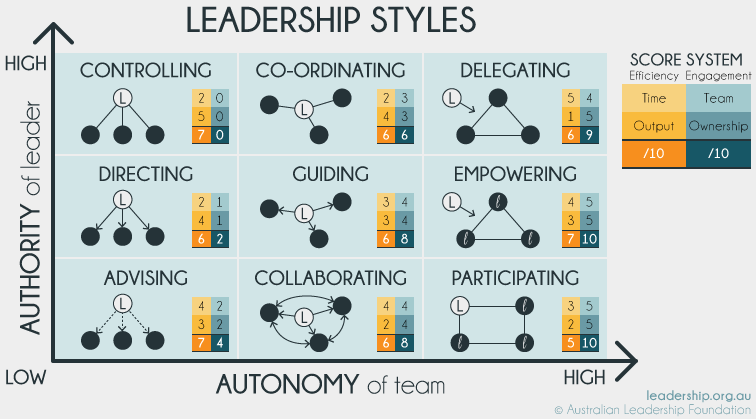Why do people feel the urge to become a manager?
Why do people feel the urge to become a manager?
What drives managers?
With the exception of public sector, in any organisation you find plenty of people that desperately want to become a manager. What is driving them, especially because the majority does not have what it takes to “manage”.
20 Signs That Your Boss May Be a Psychopath
Status symbol
An important reason people want to become a manager is the status symbol that the function of manager represents. Managers are perceived as higher and more important in the food chain, that’s how they also want to be seen. In general becoming manager is the goal for this category and not a way to achieve larger goals like running the show better or having more influence to let the organisation pursue their vision.
This type of managers are able to grope their way to the top anyway, though not through honest hard work, but by keeping up appearances upwards and treating people below like dirt.

They do everything to ride that fat car as a way to show off to the people that bullied them at school
[better parking spot for management as a way to strengthen the status of management]
Career Path
In most organisations, the grades in the functional building are much higher for management. This supports the perception that a manager is more important and contributes more to the output of an organisation than any other role, even the top ICT engineer inventing the new killer App. The only way for non-management to evolve their career via promotions is to step into the management path as well.
Here you will find the autistic specialists without management vision or people management capabilities, mainly focussing on details by micro-managing the resources within their competence and neglecting the other disciplines.
you’ll be doing a lot less of the type of work that got you promoted to that level.
Pay
Financial and non-financial incentives are a driver for many people, continuous increase of rewards for them is very important. In parallel with career also the pay ceiling is much higher in management than in other disciplines. The only way for non-managers to get promotion and pay the mortgage for that bigger family house is to step into management as well.
These artificially made managers of course have consequences for quality of management and often result in non-people managers but technocrats.
In public sector employees are not very eager to act in a management role. They have to be explicitly requested and pushed by their bosses to populate the (lower) management positions. General tendency is that no one wants to be manager of not motivated public colleagues, without notable (financial) incentives and facing potential criticism from their former peers.
In the private sector employees are more career, status and reward driven, there you find plenty of people who desperately strive for a management career.
Read the Harvard Business Review article “Why Government Workers Are Harder to Motivate”
Influence
Being in management grants employees influence in their organisation to build and run things as they see fit, better than done by others, at least that is what they believe.
This driver often results in prescriptive or micromanagement where the conceptual view is far from the reality and the gap between Work As Imagined vs Work As Done is only increasing. This style often results in an industrialist approach to managing people - “manager smart, worker stupid”.
Leaders lead people. Managers manage tasks.
Leaders lead people to manage their tasks, managers manage tasks
The main difference between leaders and managers is that leaders have people follow them while managers have people who work for them. A successful business owner needs to be both a strong leader and manager to get their team on board to follow them towards their vision of success.
Desire for Power
It is for the supposed “power” that comes from telling others what to do.
Bullied at school and now looking for revenge. They believe that there is a finite amount of power in an organization, and it is their job to amass as much of it as possible.
This type of managers does not listen to employees because that would be surrendering their own power. They irresponsibly exercise their place in the hierarchy in a selfish manner to advance their own goals – while minimizing the wants and needs of their employees. Managers like this assume that their employees are not paying attention or don’t have the courage to speak-up and confront them. Typically they engage in behaviours such as degrading and making fun of employees, lying and being deceptive, blaming others when things go wrong, and perhaps going so far as to harass and engage in physical aggression.
Why Anyone Would Want to Control You
Psychopathy, narcissism, and a desire to control others seem to be important elements in acquisition of power. These are character traits derived from genetic and epigenetic influences (i.e., nature and nurture)
It comes, at least in part, from Evolution.
ie Higher Status (in hierarchies, eg social systems) means better access to mates, food, territory, other resources, etc.
So, it's an evolutionary imperative, for survival and reproduction.
There are plenty of theories why someone would want to control you. One is that people who can’t control themselves turn to controlling others. This happens on an emotional level. A person full of insecurities has to exact a positive sense of self from other people because their self esteem is too low to do it for themselves.
Read more…
“Power as influence is expressed in having control over others, which could involve responsibility for others,” they write. “In contrast, power as autonomy is a form of power that allows one person to ignore and resist the influence of others and thus to shape one’s own destiny.”
References:
http://www.forbes.com/sites/glennllopis/2013/12/16/6-reasons-managers-take-their-employees-for-granted/#1c8003792c83
https://hbr.org/2003/01/power-is-the-great-motivator
https://www.theatlantic.com/health/archive/2016/03/people-want-power-because-they-want-autonomy/474669/
https://www.quora.com/What-is-the-root-cause-for-the-desire-to-have-power-over-other-people
Effective managers
Managers fall into three motivational groups. Those in the first, affiliative managers, need to be liked more than they need to get things done. Their decisions are aimed at increasing their own popularity rather than promoting the goals of the organization. Managers motivated by the need to achieve—the second group—aren’t worried about what people think of them. They focus on setting goals and reaching them, but they put their own achievement and recognition first. Those in the third group—institutional managers—are interested above all in power. Recognizing that you get things done inside organizations only if you can influence the people around you, they focus on building power through influence rather than through their own individual achievement. People in this third group are the most effective, and their direct reports have a greater sense of responsibility, see organizational goals more clearly, and exhibit more team spirit.
People who successfully run their own small businesses are not automatically successful managers. The key to their success has turned out to be what psychologists call the need for achievement, the desire to do something better or more efficiently than it has been done before.
The manager’s job seems to call more for someone who can influence people than for someone who does things better alone. In motivational terms, then, we might expect the successful manager to have a greater need for power than a need to achieve. But there must be other qualities besides the need for power that go into the makeup of a good manager. We will discuss here just what these qualities are and how they interrelate.
10 Requirements for the perfect manager
http://www.techrepublic.com/blog/10-things/10-requirements-of-the-perfect-manager/
Why should I become a manager? Is being a manager my goal or my perception of a way to achieve my larger goals? more money and a better status symbol, only promotion path
According to survey findings, only 28% of Millennials feel that their current job takes full advantage of their skill set. Looked at through this lens, the urge to be the boss may be less about grabbing the brass ring and more about feeling that moving up the corporate ladder is where greater autonomy and freedom lies
• Being a boss means that you’re ultimately accountable for the output of your team — for better or worse. While you look like a hero when those under you overdeliver, if your team comes up short, you’re the fall guy. As a manager, you don’t live and die based on your own efforts, but how well you’re able to motivate and manage the efforts of others. Your success is no longer directly within your control, instead it’s based on an aggregation of what those who work for you achieve, which can leave you feeling powerless instead of powerful.
• If you’ve never aspired to go into politics or to work in a daycare, perhaps being a manager isn’t for you. Immersing yourself in uncomfortable interpersonal situations that call for outstanding tact will become a significant portion of your workload.
• You’re No Longer A Doer
Ironically enough, once you’re a manager, you’ll be doing a lot less of the type of work that got you promoted to that level.
Here are the “right” reasons for being a people manager:
You care about people and want to help others succeed as you have by providing guidance and direction.
You are eager to share your own knowledge and expertise, but also to learn from others.
You know you don’t have all the answers and want to partner with your team to provide the best work product.
You enjoy working with others collaboratively.
You want to be a mentor to help others develop professionally, helping them to get what they need so that they are successful.
You love working with people! They engage you and keep you motivated and you do the same for them.
You put your team’s needs ahead of your own.
You help to align your individual team member’s goals with the organizational goals and goals set without your department or work group.


